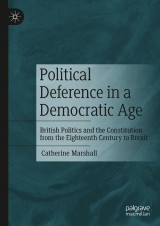Details

Political Deference in a Democratic Age
British Politics and the Constitution from the Eighteenth Century to Brexit|
CHF 153.50 |
|
| Verlag: | Palgrave Macmillan |
| Format: | |
| Veröffentl.: | 13.01.2021 |
| ISBN/EAN: | 9783030625399 |
| Sprache: | englisch |
Dieses eBook enthält ein Wasserzeichen.
Beschreibungen
<p>This book explores the concept of deference as used by historians and political scientists. Often confused and judged to be outdated, it shows how deference remains central to understanding British politics to the present day. This study aims to make sense of how political deference has functioned in different periods and how it has played a crucial role in legitimising British politics. It shows how deference sustained what are essentially English institutions, those which dominated the Union well into the second half of the twentieth century until the post-1997 constitutional transformations under New Labour. While many dismiss political and institutional deference as having died out, this book argues that a number of recent political decisions – including the vote in favour of Brexit in June 2016 – are the result of a deferential way of thinking that has persisted through the democratic changes of the twentieth century. Combining close readings of theoretical texts with analyses of specific legal changes and historical events, the book charts the development of deference from the eighteenth century through to the present day. Rather than offering a comprehensive history of deference, it picks out key moments that show the changing nature of deference, both as a concept and as a political force.</p>
<div>Chapter 1: Introduction: Why ‘Deference’?</div><div><br></div>Part I: Theory of Deference from the Eighteenth Century to 1911 – Definitions in Context<div>Chapter 2: The Constitution of Political Deference</div>Chapter 3: Deference and the Politics of Notables<div>Chapter 4: Walter Bagehot, The ‘Darwin of Deference’</div><div>Chapter 5: The Dilemma(s) of Voluntary Deference in the Fin de Siècle.</div><div><br></div><div>Part II: The Practice of Deference in a Democratic Age – A User’s Guide</div><div>Chapter 6: The Challenges to Voluntary Deference (1911–1945)</div><div>Chapter 7: Voluntary Deference in Crisis (1945–1972)</div><div>Chapter 8: The Rejection of Rational deference (1973–1997)</div><div>Chapter 9: The ‘Afterlife’ of Deference (1997–2016)</div><div><br></div><div>Chapter 10: Conclusion: Deference for the Democratic Age.<br></div>
<p><b>Catherine Marshall</b> is Professor of British Studies at CY Cergy Paris Université, France. Her research focuses mainly on the history of ideas in mid-Victorian England and the legacy of some of those ideas on twentieth and twenty-first century Britain. She teaches British history and the history of political ideas.</p>
<p>This book explores the concept of deference as used by historians and political scientists. Often confused and judged to be outdated, it shows how deference remains central to understanding British politics to the present day. This study aims to make sense of how political deference has functioned in different periods and how it has played a crucial role in legitimising British politics. It shows how deference sustained what are essentially English institutions, those which dominated the Union well into the second half of the twentieth century until the post-1997 constitutional transformations under New Labour. While many dismiss political and institutional deference as having died out, this book argues that a number of recent political decisions – including the vote in favour of Brexit in June 2016 – are the result of a deferential way of thinking that has persisted through the democratic changes of the twentieth century. Combining close readings of theoretical texts with analyses of specific legal changes and historical events, the book charts the development of deference from the eighteenth century through to the present day. Rather than offering a comprehensive history of deference, it picks out key moments that show the changing nature of deference, both as a concept and as a political force.<b><br></b></p><p><b>Catherine Marshall</b> is Professor of British Studies at CY Cergy Paris Université, France. Her research focuses mainly on the history of ideas in mid-Victorian England and the legacy of some of those ideas on twentieth and twenty-first century Britain. She teaches British history and the history of political ideas.<br></p><p></p><br><br><p></p>
<p>Unpacks the changing concept of political deference from the eighteenth century to the present day</p><p>Argues that deference continues to play a significant role in legitimising British politics</p><p>Combines close readings of theoretical texts with analyses of legal changes and historical events to highlight key moments in the development of deference</p>
“This is a fine piece of work and one which seeks to explain a very important, and much-neglected, dimension of the distinctive character of British politics.”<div>—Jeremy Jennings, Professor of Political Theory, King’s College, London</div><div><br></div><div>“This is a work of great originality and excellent quality of scholarship, displaying an unusual degree of imaginative engagement with a contemporary issue with the aid of a deep historical understanding of the cultural and political context in which the contemporary issue arose and is played out.”</div><div>— Georgios Varouxakis, Professor of the History of Political Thought, Queen Mary University, London</div>

















